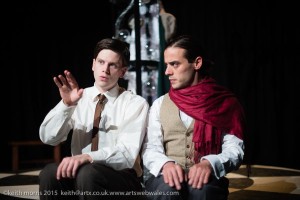To Kill a Machine questions something so fundamental, so ingrained within society and across cultures, and so ultimately problematic: the distinction between man and woman. Catrin Fflur Huws’ stunningly crafted script shies away from the Hollywood notion we now have of the Alan Turing story (Benedict Cumberbatch was good but I wish he had have seen this first). What has been born from her efforts is a profoundly human story of right and wrong.
Scriptography Productions formed in 2012 with a particular mission to ‘place writing and writers at its core’. It has very much fulfilled its mission here as the writing is so strong in dramatic terms it concurrently opens up the universal and intensely personal at the heart of the Turing story. The play intermittently uses a game show format, ‘The Imitation Game,’ to magnify particular events throughout Turing’s life. The nature of the game, where the hosts try to guess the gender of the contestants through a series of yes/no questions, is the catalyst for the bigger questions within the play: stereotypes of men/women, the difference between man and machine and so on.
Rick Yale and Gwydion Rhys
In the hands of director Angharad Lee, the script flourishes and retains the wonderful theatrical intimacy that the story within requires. The choice to make the set an essential character was genius. Sitting on a checkerboard wheel of fortune/misfortune and adorned with artefacts key to the plot and Turing’s life story, the design (Cordelia Ashwell) works incredibly well as a vehicle for the cyclical nature of the story (cause and effect). The staging around and with the set is masterfully crafted by Lee in the somewhat challenging, albeit beautiful, venue of The Gate theatre space.
Gwydion Rhys and Francois Pandolfo
All four actors in this production give first-rate performances observing exactly the right balance of subtly and flamboyancy (in the game show scenes). The three supporting actors filled the stage with their multiple roles. Robert Harper, as ‘The Interrogator’, gave a wonderfully vocal performance making excellent use of his skills around Received Pronunciation. Rick Yale plays ‘The Betray’, co-conspirator with ‘The Interrogator’ and Turing’s lethal lover, each role he performs with utter conviction and playfulness – Harper and Yale provide fantastic humour throughout, their timing is brilliant. Francois Pandolfo is excellent as ‘The Friend’ dealing particularly well with the subtle physical transitions of character needed to transform from one ‘friend’ to another – he, along with Turing, provide one my favourite moments within the play: when Turing is in the docks answering for his ‘crime’ the friend momentarily holds his hand in support. The ambiguity of which friend Pandolfo is at this points is what works in this moment.
Robert Harper and Rick Yale
Gwydion Rhys gives a virtuoso performance as Alan Turing playing the part with great sensitivity and conviction. Rather than playing the homosexuality or the stammer he played the objectives of logic that ruled Turing throughout his life, for better and for worse: a stunning performance.
The Gate theatre venue really separates the men from the boys and women from the girls (kind of like the Imitation Game) with it demanding internal architecture. A strong company can triumph here but the weaker ones will be exposed. This production however, through its use of the disparate theatrical languages, e.g. the set design, lighting (Maisie Baynham), and the text, it has, indeed, triumphed.


